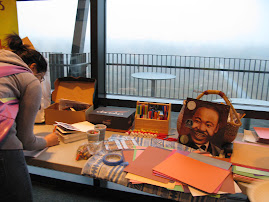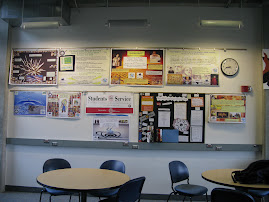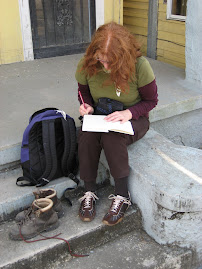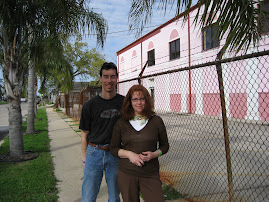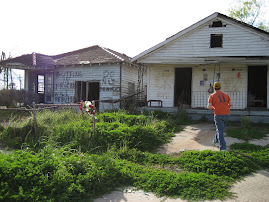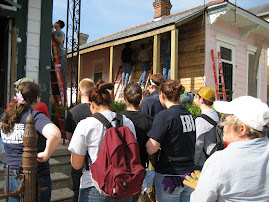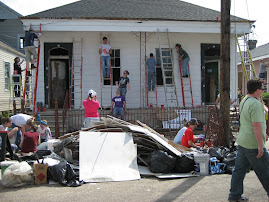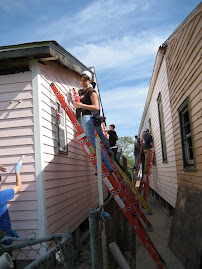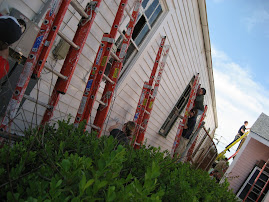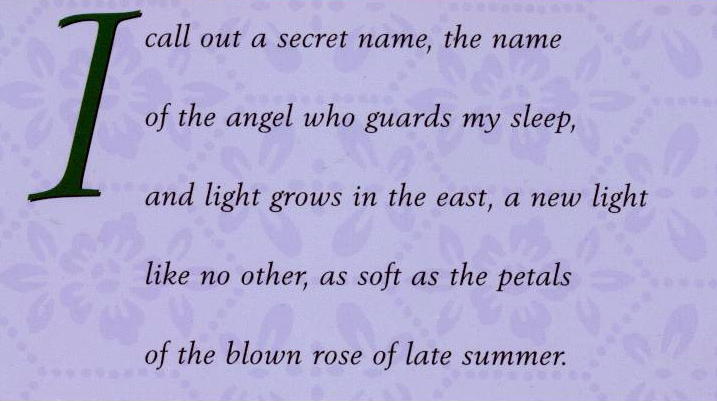Another generation of females captivates my husband
as our granddaughter watches over, arms folded, index finger on cheek
when he bends down to fix the bike sprocket, or sorts through the kitchen drawers
to find the wrench to tighten the training wheel bolts, and I can see
him as the big brother to his sister in '53, try to
patch the family with hand tools, or later, in '63, hood open
to his mother's Ford as he leans in to check the oil on dipstick,
the water level in the radiator so she can drive away.
Wednesday, April 30, 2008
Tuesday, April 29, 2008
American Sentences: April 29, 08
Is this how it feels to be homeless, without a tent, sleeping on
the sidewalk, wishing for hooves, how they chipped the grass when I couldn't run?
Breaking bread for jays, molted eagle feather drifts to rhododendron.
the sidewalk, wishing for hooves, how they chipped the grass when I couldn't run?
Breaking bread for jays, molted eagle feather drifts to rhododendron.
Monday, April 28, 2008
American Sentences: April 28, 08
I entice you to eat oatmeal, flax seed, blueberries with cold milk;
the feed of our ancestors who told us they'd meet us again, someday.
Kirk, were you trying to tell me the story about the little frog
in Indonesia?
Be there in a minute.
That lives in the swift streams and breathes through its skin to keep it from becoming too buoyant, swept away.
the feed of our ancestors who told us they'd meet us again, someday.
Kirk, were you trying to tell me the story about the little frog
in Indonesia?
Be there in a minute.
That lives in the swift streams and breathes through its skin to keep it from becoming too buoyant, swept away.
Sunday, April 27, 2008
American Sentences: April 27, 08
And might I see made whole all crumbled things*--scent of anisette, the spot
on the tablecloth, loin marrow in the wooden bowl's crevise, pocket-
knife whittles and the hand's gesture when the match is struck, sticks smouldering
in straw, or the arms overhead when clothes are hung out to bleach of sky--
for what is broken but the brain's sorrowful attempt to make meaning--
New Orleans a theatre of wrought iron scenes amidst clutter, the uncounted
boxed losses, reliquary of aftermath; or maybe envision
suburban houses, how trees and rocks are planted, the mother dragging
manure sacks to the yard now laboring in cubicle, the concrete
fiber and pollen, remembrance of elders in the distance, great-grand
parents like vintage poems that will wait years to be found, translated and
published, and to ripen like figs plums apricots bruised by the summer
hail, autumn's scrim, entwined within the red cedar scent, scat of blue
jay staccato drunk on holly berry; fragmant of the first family--
the children's oval faces at the picture window on St. Francis,
122nd, or was it 42nd; their view to the street
clogged by camellias and the old growth dogwood the builders let stand.
* Please find below the poem by Jose Kozer from which this writing is inspired.
on the tablecloth, loin marrow in the wooden bowl's crevise, pocket-
knife whittles and the hand's gesture when the match is struck, sticks smouldering
in straw, or the arms overhead when clothes are hung out to bleach of sky--
for what is broken but the brain's sorrowful attempt to make meaning--
New Orleans a theatre of wrought iron scenes amidst clutter, the uncounted
boxed losses, reliquary of aftermath; or maybe envision
suburban houses, how trees and rocks are planted, the mother dragging
manure sacks to the yard now laboring in cubicle, the concrete
fiber and pollen, remembrance of elders in the distance, great-grand
parents like vintage poems that will wait years to be found, translated and
published, and to ripen like figs plums apricots bruised by the summer
hail, autumn's scrim, entwined within the red cedar scent, scat of blue
jay staccato drunk on holly berry; fragmant of the first family--
the children's oval faces at the picture window on St. Francis,
122nd, or was it 42nd; their view to the street
clogged by camellias and the old growth dogwood the builders let stand.
* Please find below the poem by Jose Kozer from which this writing is inspired.
Saturday, April 26, 2008
American Sentences: April 26, 08
Jenn says she will dance, and I believe, dazzle the audience with verve.
Jose and Mark on Whidbey I can't reach, the Cuban poet, his translator.
Jose and Mark on Whidbey I can't reach, the Cuban poet, his translator.
Friday, April 25, 2008
Poem of the Week: Last will & testament by Jose Kozer
Last will & testament
The truth is I only care about words, not every word (I don't care for
the word word, if truth be told) snow isn't a word I
care for (I don't care to be cold, and snow--I mean to
say lyric snow--has become so commonplace) one
less word now: and for the letter n there are others.
A multitude. Nabob, an exotic word--not the least
chance to use it, a sonorous word, but there's an over-
abundance of sonorous words, we can discard it:
what's left? The fugitive image of any word, lack-
ing an image leaves a concept (leaping inside us) it
crumbles: in truth I care not at all for the word noth-
ing, abstractions leave me limp with boredom, tepid
tepid abstractions: I want to see and touch (above
all touch); I want to sniff the spoor of the word buck-
wheat, my god, how many combinations: the words
are mill-stones turning; whatever word a mill vane
broken into syllables; and at the edge the dying,
what does it say. Marah, marah: is that what it says?
I listen closely, nothing but interference; and I taste,
I crush a stem of purslane against my palate, but it
clarifies or tells me nothing now: here on the edge,
manna, masquerade are the remaining words, back-
ward, or forward to this place, at the edge: what, to
what to speak with words: listen to me, the bread
that I've put on the table parts, down to the center
of its husk, brings forth ash (ants brought forth once
more): and then, what. Things are obscured by so
much thought, classification and description, de-
scription doesn't bring the chameleon back to the
chameleon, doesn't bring back the mother, doesn't
bring anything back to us, let's clear the way for the
jacaranda of this life, I am homet (the lizard): noth-
ing. A green thing that lost its tail. The masquerade
of her whose veil is dropped, see the face's skull,
the body's bones, skin of golgotha peeled away now:
the donnybrook I was once, now I sit down and slide
inwards: outside a lovely day. Euphrates. Much dis-
tance. A god of nickle or zinc can't cope with people,
nitrogen has been enough to keep me alive. Spuri-
ous, but alive. With some or another word but not
with every word. The word capuli tells me nothing,
it has nothing to do with me; dying, for instance, I
can't adjust to its destiny: nor, finally, to the dictio-
nary--too vast. At the final moment any word will
do; linen, for instance, at that moment: the ark on
one's shoulder, bread on the table, hand on head,
and at the head's point of transcendence, be it the
word wheatfield that I hear, for instance, in the yel-
low crossing of axles: or be it bread, by omission.
And might I see made whole all crumbled things.
from Stet, selected poems by Jose Kozer, translated by Mark Weiss, Junction Press
The truth is I only care about words, not every word (I don't care for
the word word, if truth be told) snow isn't a word I
care for (I don't care to be cold, and snow--I mean to
say lyric snow--has become so commonplace) one
less word now: and for the letter n there are others.
A multitude. Nabob, an exotic word--not the least
chance to use it, a sonorous word, but there's an over-
abundance of sonorous words, we can discard it:
what's left? The fugitive image of any word, lack-
ing an image leaves a concept (leaping inside us) it
crumbles: in truth I care not at all for the word noth-
ing, abstractions leave me limp with boredom, tepid
tepid abstractions: I want to see and touch (above
all touch); I want to sniff the spoor of the word buck-
wheat, my god, how many combinations: the words
are mill-stones turning; whatever word a mill vane
broken into syllables; and at the edge the dying,
what does it say. Marah, marah: is that what it says?
I listen closely, nothing but interference; and I taste,
I crush a stem of purslane against my palate, but it
clarifies or tells me nothing now: here on the edge,
manna, masquerade are the remaining words, back-
ward, or forward to this place, at the edge: what, to
what to speak with words: listen to me, the bread
that I've put on the table parts, down to the center
of its husk, brings forth ash (ants brought forth once
more): and then, what. Things are obscured by so
much thought, classification and description, de-
scription doesn't bring the chameleon back to the
chameleon, doesn't bring back the mother, doesn't
bring anything back to us, let's clear the way for the
jacaranda of this life, I am homet (the lizard): noth-
ing. A green thing that lost its tail. The masquerade
of her whose veil is dropped, see the face's skull,
the body's bones, skin of golgotha peeled away now:
the donnybrook I was once, now I sit down and slide
inwards: outside a lovely day. Euphrates. Much dis-
tance. A god of nickle or zinc can't cope with people,
nitrogen has been enough to keep me alive. Spuri-
ous, but alive. With some or another word but not
with every word. The word capuli tells me nothing,
it has nothing to do with me; dying, for instance, I
can't adjust to its destiny: nor, finally, to the dictio-
nary--too vast. At the final moment any word will
do; linen, for instance, at that moment: the ark on
one's shoulder, bread on the table, hand on head,
and at the head's point of transcendence, be it the
word wheatfield that I hear, for instance, in the yel-
low crossing of axles: or be it bread, by omission.
And might I see made whole all crumbled things.
from Stet, selected poems by Jose Kozer, translated by Mark Weiss, Junction Press
Thursday, April 24, 2008
American Sentences: April 24, 08
And the call of the sea is mirrored in the touch of the velvet plush
manta-rays, how they linger in the shallow aquarium touch-tank
at Monterey Bay; flat, wizened souls, expectant and hopeful, perhaps,
if hope can be read into this exchange, as though something can come of
petting beneath the surface saltwater where these interactions take
place between this primordial fish and us, who lean over the lip
of the touch-tank, restless and yet lingering, as when reading the page.
manta-rays, how they linger in the shallow aquarium touch-tank
at Monterey Bay; flat, wizened souls, expectant and hopeful, perhaps,
if hope can be read into this exchange, as though something can come of
petting beneath the surface saltwater where these interactions take
place between this primordial fish and us, who lean over the lip
of the touch-tank, restless and yet lingering, as when reading the page.
Subscribe to:
Posts (Atom)
